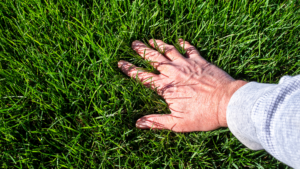
Reducing Soil Compaction Naturally: Key Practices for Healthier Turf
A thriving lawn starts with healthy soil, but soil compaction can quickly derail your efforts. Compacted soil is dense and hard, which prevents water, nutrients, and air from reaching grass roots. This leads to weak grass that struggles to grow. Common causes of soil compaction include heavy foot traffic, the use of heavy machinery, and even natural processes like rain.

Luckily, there are natural ways to reduce soil compaction and bring your lawn back to life. Organic methods ensure that your lawn gets what it needs without harmful chemicals. These techniques not only improve soil structure but also promote deep root growth and overall lawn vitality.
In this guide, we’ll dive into the effects of soil compaction and explore the benefits of maintaining healthy, loosened soil. We’ll then discuss various natural methods to reduce soil compaction and how to keep your soil in great shape year-round. With the right practices, you can create a lush, green lawn that’s resilient and beautiful.
Understanding Soil Compaction and Its Impact
Soil compaction happens when soil particles are pressed together tightly, making the ground hard and dense. This usually occurs due to heavy foot traffic, use of machinery, or even natural causes like rainfall. When soil becomes compacted, it loses its ability to absorb air, water, and nutrients, which are essential for plant health.
Compacted soil creates a tough environment for grass roots. The roots can’t penetrate deep into the soil, leaving them shallow and weak. This results in poor grass growth and makes the lawn more susceptible to pests, diseases, and drought. Compacted soil can also lead to water runoff, as the soil is too hard to absorb water effectively. This can cause puddling and erosion, further damaging your lawn.
Understanding the effects of soil compaction is crucial for maintaining a healthy lawn. Recognizing the signs of compacted soil, such as hard ground, poor grass growth, and water pooling, can help you take timely action to alleviate the problem.
Benefits of a Healthy, Loosened Soil
Healthy, loosened soil provides many advantages for your lawn. The most significant benefit is better root growth. When soil is loose, roots can dig deeper and spread out, making the grass stronger and more resilient. Deeper roots access more nutrients and water, which helps the grass stay healthy even during dry periods.
Loosened soil improves water absorption. This prevents runoff and erosion, keeping your lawn uniformly hydrated. Better water absorption also reduces the need for frequent watering, saving you time and conserving water. Healthy soil is home to beneficial organisms like earthworms, which aerate the soil naturally, enhancing its structure over time.
A lawn with loosened soil is less prone to pest infestations and diseases. The robust root system of grass in healthy soil outcompetes weeds and is less likely to attract harmful pests. The overall result is a lush, green lawn that’s visually appealing and environmentally friendly. Understanding these benefits reinforces the importance of maintaining loose, healthy soil for the long-term vitality of your turf.
Natural Methods to Reduce Soil Compaction
Tackling soil compaction can be done effectively with several natural methods. These techniques promote healthy soil without the need for harmful chemicals.
- Aeration: Aeration involves making small holes in your lawn to allow air, water, and nutrients to penetrate the soil effectively. You can use a manual or mechanical aerator. This process reduces soil density and encourages deeper root growth.
- Adding Organic Matter: Compost and other organic materials improve soil structure. Spread a thin layer of compost over your lawn and rake it in. Organic matter increases soil porosity and helps retain moisture and nutrients.
- Planting Ground Covers: Ground covers like clover can reduce soil compaction. These plants have deep roots that break up soil naturally, reducing compaction over time.
- Using Mulch: Mulch helps keep soil moist and minimizes compaction. Apply a layer of organic mulch, such as straw or wood chips, around plants to protect the soil.
- Earthworms: Encourage earthworms in your garden. These natural soil aerators improve soil structure and fertility. Adding a layer of mulch or organic matter can attract earthworms.
Using these natural methods regularly can help reduce soil compaction and keep your lawn healthy and vibrant.
Regular Maintenance Practices for Long-Term Soil Health
Maintaining soil health requires consistent practices that ensure your lawn stays loose and nutrient-rich. Here are some key maintenance tips:
- Seasonal Aeration: Schedule aeration at least once a year, preferably in the fall or spring. This allows your lawn to recover and grow stronger roots during the active growing seasons.
- Regular Feeding: Feed your lawn with organic fertilizers or compost. Regular feeding improves soil structure and provides essential nutrients that keep the grass healthy.
- Proper Watering Techniques: Watering deeply but infrequently is best. This encourages roots to grow deeper into the soil. Avoid overwatering, which can lead to waterlogged soil and compaction.
- Avoiding Heavy Traffic: Limit heavy traffic on your lawn. Create designated pathways or install stepping stones to prevent constant foot traffic from compacting the soil.
- Diversified Planting: Including a variety of plants in your yard can enhance soil health. Different root systems help to keep the soil loose and fertile.
These regular maintenance practices ensure your soil stays healthy in the long term, promoting a lush, green lawn.
Conclusion
Reducing soil compaction is vital for maintaining a healthy lawn. Understanding the causes and impacts of compacted soil allows us to take effective actions using natural methods. Healthy, loosened soil fosters deep, resilient root growth and makes your lawn more robust against pests and diseases. Regular maintenance ensures that soil remains in good condition throughout the year.
Green Queen offers non-toxic services that help promote lawn health in environmentally friendly ways. Contact Green Queen for all your lawn care needs and discover the benefits of organic lawn maintenance. Let’s create a vibrant, healthy turf together.
